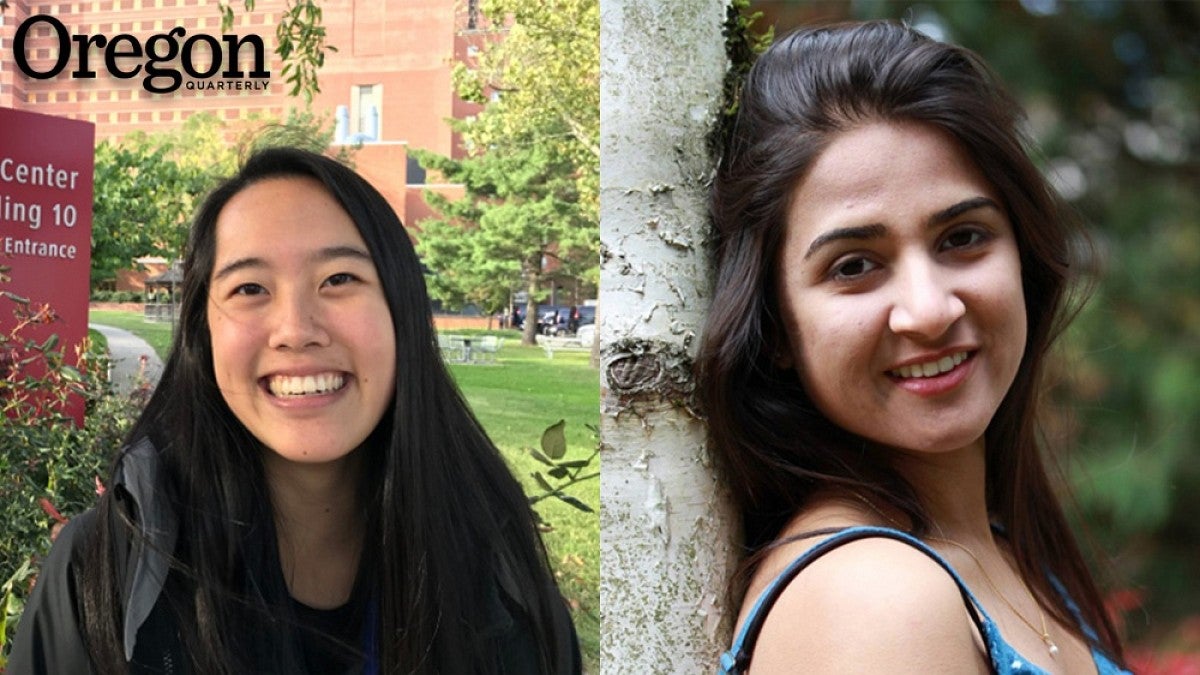Zoë Wong (left) and Anisha Adke (right).
Senior year can be a time of stress, anticipation, and a litany of other emotions.
For Anisha Adke and Zoë Wong, the excitement of the 2017–18 year was amplified by plans to move across the country after graduation for research internships with a top institute.
Both in the Robert Donald Clark Honors College, the biology majors became fast friends. As seniors, they swapped links for postgrad opportunities, and they landed two-year fellowships at the National Institutes of Health.
Adke joined a neuroscience lab at the Bethesda, Maryland, campus in August 2018. Wong accepted a position in a vascular matrix and genetics lab.
Both say undergraduate research gave them an edge in their applications and interviews.
RELATED LINKS
Adke worked in assistant biology professor Adam Miller’s lab, studying the genetic basis of neurodevelopment. “That was my education,” she says. “[The UO research] taught me to ask hypothesis-driven questions based on my data.”
Wong worked in biology professor Karen Guillemin’s lab. She investigated host-microbe interactions in the midgut of a fly called Drosophila, a research project she turned into her thesis for the honors college.
“That’s where I learned who I want to be as a scientist and critical thinker,” Wong says.
University efforts are ramping up to enhance student success and place more emphasis on helping them connect their studies to career paths. When students such as Adke and Wong share their academic research experiences, it resonates with UO academic leadership.
“One of the chief virtues of being at a leading research university is the opportunity it provides for students to experience the transformative power of research and deep scholarship, both for personal intellectual growth and for an opportunity to make a difference in the world,” says Patrick Phillips, provost and senior vice president. “These students are great examples of how hands-on research experiences for undergraduates can spark a passion that can turn into a career. We have renewed focus to provide these kind of experiences to our students from all across the university, from the sciences to the humanities to the professional schools and colleges.”
Wong is studying Williams syndrome, a genetic disorder associated with neurocognitive and cardiovascular abnormalities. She splits her time between research and an NIH clinic where she meets with patients who have the disorder.
“Patients are coming to you at different stages of vulnerability, and you have to feel that as you interact with them,” Wong says. “You can’t just see them as a study ID number.”
Working in the clinic and seeing the people whose lives are affected by the research she conducts has confirmed for Wong that she wants to pursue an MD-PhD program—a dual doctoral degree for physician-scientists.
Adke is also interested in an MD-PhD degree. She was inspired by her undergraduate experience with the Inside Out Prison Exchange Program, which brings college students together with incarcerated individuals to study as peers behind prison walls.
While working with the Inside Out program, she met individuals affected by addiction and the opioid crisis. Adke read up on the issue, intrigued by how much is still unknown about pain, addiction, and the interplay between the two.
At the NIH, she investigates the neurobiology underlying neuropathic pain, with the goal of finding nonaddictive alternatives for pain treatment. She found her passion for the nitty-gritty aspects of research through her university lab experience.
“It was such a good experience,” Adke says, “I wanted to do it for the rest of my life.”
--By Isabella Garcia, BS ’19 (journalism), writer and web developer for the Clark Honors College.


